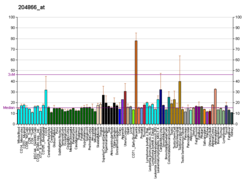From Wikipedia, the free encyclopedia
Protein Jade-3 is a protein that in humans is encoded by the PHF16 gene .[ 5] [ 6]
This gene is part of a gene cluster on chromosome Xp11.23. The encoded protein contains a zinc finger motif often found in transcriptional regulators , however, its exact function is not known. Alternative splicing results in multiple transcript variants encoding the same protein.[ 6]
References
^ a b c GRCh38: Ensembl release 89: ENSG00000102221 – Ensembl , May 2017^ a b c GRCm38: Ensembl release 89: ENSMUSG00000037315 – Ensembl , May 2017^ "Human PubMed Reference:" . National Center for Biotechnology Information, U.S. National Library of Medicine .^ "Mouse PubMed Reference:" . National Center for Biotechnology Information, U.S. National Library of Medicine .^ Thiselton DL, McDowall J, Brandau O, Ramser J, d'Esposito F, Bhattacharya SS, Ross MT, Hardcastle AJ, Meindl A (Apr 2002). "An integrated, functionally annotated gene map of the DXS8026-ELK1 interval on human Xp11.3-Xp11.23: potential hotspot for neurogenetic disorders". Genomics . 79 (4): 560–72. doi :10.1006/geno.2002.6733 . PMID 11944989 . ^ a b "Entrez Gene: PHF16 PHD finger protein 16" .
Further reading
Nagase T, Seki N, Ishikawa K, et al. (1997). "Prediction of the coding sequences of unidentified human genes. VI. The coding sequences of 80 new genes (KIAA0201-KIAA0280) deduced by analysis of cDNA clones from cell line KG-1 and brain" . DNA Res . 3 (5): 321–9, 341–54. doi :10.1093/dnares/3.5.321 PMID 9039502 . Szelei J, Soto AM, Geck P, et al. (2000). "Identification of human estrogen-inducible transcripts that potentially mediate the apoptotic response in breast cancer". J. Steroid Biochem. Mol. Biol . 72 (3–4): 89–102. doi :10.1016/S0960-0760(00)00025-X . PMID 10775800 . Strausberg RL, Feingold EA, Grouse LH, et al. (2003). "Generation and initial analysis of more than 15,000 full-length human and mouse cDNA sequences" . Proc. Natl. Acad. Sci. U.S.A . 99 (26): 16899–903. doi :10.1073/pnas.242603899 . PMC 139241 PMID 12477932 . Tzouanacou E, Tweedie S, Wilson V (2003). "Identification of Jade1, a gene encoding a PHD zinc finger protein, in a gene trap mutagenesis screen for genes involved in anteroposterior axis development" . Mol. Cell. Biol . 23 (23): 8553–2. doi :10.1128/MCB.23.23.8553-8562.2003 . PMC 262661 PMID 14612400 . Beausoleil SA, Jedrychowski M, Schwartz D, et al. (2004). "Large-scale characterization of HeLa cell nuclear phosphoproteins" . Proc. Natl. Acad. Sci. U.S.A . 101 (33): 12130–5. doi :10.1073/pnas.0404720101 . PMC 514446 PMID 15302935 . Gerhard DS, Wagner L, Feingold EA, et al. (2004). "The status, quality, and expansion of the NIH full-length cDNA project: the Mammalian Gene Collection (MGC)" . Genome Res . 14 (10B): 2121–7. doi :10.1101/gr.2596504 . PMC 528928 PMID 15489334 . Ross MT, Grafham DV, Coffey AJ, et al. (2005). "The DNA sequence of the human X chromosome" . Nature . 434 (7031): 325–37. doi :10.1038/nature03440 . PMC 2665286 PMID 15772651 . Kimura K, Wakamatsu A, Suzuki Y, et al. (2006). "Diversification of transcriptional modulation: large-scale identification and characterization of putative alternative promoters of human genes" . Genome Res . 16 (1): 55–65. doi :10.1101/gr.4039406 . PMC 1356129 PMID 16344560 . Olsen JV, Blagoev B, Gnad F, et al. (2006). "Global, in vivo, and site-specific phosphorylation dynamics in signaling networks". Cell . 127 (3): 635–48. doi :10.1016/j.cell.2006.09.026 . PMID 17081983 .
External links
This article incorporates text from the United States National Library of Medicine , which is in the public domain .
(1) Basic domains
(1.1) Basic leucine zipper (bZIP )(1.2) Basic helix-loop-helix (bHLH )
Group A Group B Group CPAS Group D Group E Group F
(1.3) bHLH-ZIP (1.4) NF-1 (1.5) RF-X (1.6) Basic helix-span-helix (bHSH)
(2) Zinc finger DNA-binding domains
(2.1) Nuclear receptor (Cys4 )
subfamily 1 subfamily 2 subfamily 3 subfamily 4 subfamily 5 subfamily 6 subfamily 0
(2.2) Other Cys4 (2.3) Cys2 His2 (2.4) Cys6 (2.5) Alternating composition (2.6) WRKY
(4) β-Scaffold factors with minor groove contacts
(0) Other transcription factors





